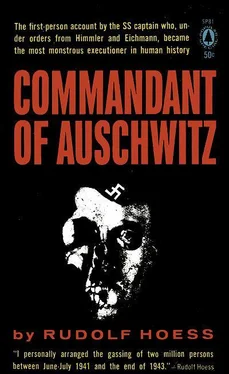The Auschwitz dog squad contained the most astonishing military material. Astonishing in the negative sense. When volunteers were sought for training as dog handlers, half the SS regiment applied. They imagined that such work would be easier and less monotonous. Since it was impossible to take on all the volunteers, the companies hit upon a cunning solution, and gave up all their black sheep, so as to be rid of them. Someone else could have the headaches now. Most of these men had been punished for some offense or other. If the commander of the guard unit had looked at these men’s conduct sheets a little more closely, he would never on any account have allowed them to be sent away for training.
At the Training and Experimental Establishment for Dog Handlers at Oranienburg some of the trainees were returned to their units before they had even finished their course, because of total unsuitability.
When those who had completed their training returned to Auschwitz they were formed into a unit, the Hundestaffel, [70]and it was not hard to see what a splendid new formation had here been created. And now it was time for them to be put to work. Either they played games with their dogs, or they found an easy hideout and went to sleep, their dogs waking them up on the approach of an “enemy,” or else passed the time in pleasant conversation with the female supervisors or the prisoners. A great many of them formed a regular liaison with the “green” controllers. Since the dog handlers were always employed in the women’s camp, it was not difficult for them to continue this liaison.
When they were bored, or wanted to have some fun, they would set their dogs on the prisoners. If they were caught doing this, they would maintain that the dog had done it of its own accord, owing to the peculiar behavior of the prisoner, or that its lead had been lost, and so on. They always had an excuse. Every day, according to their regulations, they had to give their dog further training.
Because of the time and trouble it took to train fresh dog handlers, they could only be relieved of their posts if they had been guilty of some grave offense, such as one that entailed punishment by SS court-martial, or alternatively if they had badly ill-treated or neglected their dogs. The kennelman, a former police sergeant, who had looked after dogs for more than twenty-five years, was often driven to despair by the behavior of the dog handlers. But they knew that nothing much could happen to them, and that they were unlikely actually to lose their jobs. A better commanding officer might have been able to knock this gang into shape. But the gentleman concerned had far more important things to think about. I had much trouble with the Hundestaffel, and many clashes with the commander of the guard regiment over this. [71]
I had no understanding of what was actually required of troops, at least according to Glücks’s way of thinking. Hence I was never able to get him to post away officers as soon as they became intolerable at Auschwitz.
A very great deal of trouble could have been avoided if Glücks’s attitude toward me had been different.
As the war went on the Reichsführer SS was constantly insisting on ever greater economies in the manpower employed on guard duties. The men were to be replaced by devices such as movable wire fencing, by encircling permanent places of work with electrified wire, by mine fields, and by ever larger numbers of dogs. Should a commandant manage to devise a really efficient method of economizing in the use of guards, he was given immediate promotion. But all this achieved nothing at all.
The Reichsführer SS even imagined that dogs could be trained to circle around the prisoners, as though they were sheep, and thus prevent them from escaping. One sentry, aided by several dogs, was supposed to be able to guard up to one hundred prisoners with safety. The attempt came to nothing. Men are not sheep. However well-trained the dogs were in recognizing the prisoners by their uniforms and their smell and so on, and however accurately they were taught to know how close prisoners might be allowed to approach, they were all only dogs, and could not think like human beings. If the prisoners purposely attracted them to one spot, the dogs would then leave a wide section unguarded through which they could escape.
Nor were the dogs any use in preventing a mass breakout. They would of course savagely maul some of the escapers, but they would be immediately slaughtered along with their “shepherds.”
It was also proposed that dogs should replace the guards in the watchtowers. They were to be allowed to run loose between the double wire fencing that encircled the camp or the permanent places of work, each dog guarding a certain sector, and would give warning of the approach of a prisoner thus preventing a break through the wire. This, too, came to nothing. The dogs either found a spot in which to go to sleep, or they let themselves be tricked. If the wind was in the wrong quarter the dog would notice nothing, or its barking would not be heard by the sentry.
The laying of mines was a two-edged weapon. They had to be accurately laid and their precise situation plotted on the plan of the mine field, since after three months at the most they became defective and had to be replaced. It was also necessary to walk through the mine field from time to time, and this gave the prisoners a chance to observe the lanes where no mines had been laid.
Globocnik [72]had used mines in this way at his extermination centers. But despite the carefully laid mine fields at Sobibor, the Jews knew where the lanes through the mine field ran, and were able by force to achieve a major breakout during which almost all the guard personnel were wiped out.
Neither mechanical devices nor animals can replace human intelligence.
Even the double electrified fence can be neutralized in dry weather with a few simple tools, provided a man is sufficiently cold-blooded and gives the problem a little thought. This has frequently succeeded. Often too the sentries outside the wire have come too close to it, and have had to pay for their lack of caution with their lives.
I have referred several times to what I regarded as my main task; namely, to push on, with all the means at my disposal, with the construction of all the installations belonging to the SS in the Auschwitz camp area.
Sometimes, during a period of quiet, I used to think that I could see an end in sight to the construction work resulting from the numerous schemes and plans that the Reichsführer SS had laid down for Auschwitz, but at that point new plans would arrive, involving further urgent action.
The perpetual rush in which I lived, brought about by the demands of the Reischsführer SS, by wartime difficulties, by almost daily problems in the camps, and above all by the unending stream of prisoners flowing into the whole camp area, left me no time to think of anything except my work. I concentrated exclusively on this.
Harassed thus by circumstances, I passed on my harassment in double measure to all who came under my jurisdiction, whether SS, civilians, officials, business firms, or prisoners. I had only one end in view: to drive everything and everyone forward in my determination to improve the general conditions so that I could carry out the measures laid down. The Reichsführer SS required every man to do his duty and if necessary to sacrifice himself entirely in so doing. Every German had to commit himself heart and soul so that we might win the war.
In accordance with the will of the Reichsführer SS the concentration camps were to become armaments plants. Everything else was to be subordinated to this. All other considerations must be set aside.
His words made it quite clear that the unwarrantable general conditions in the camps were of secondary importance. Armaments came first, and every obstacle to this must be overcome. I dared not allow myself to think otherwise. I had to become harder, colder, and even more merciless in my attitude toward the needs of the prisoners. I saw it all very clearly, often far too clearly, but I knew that I must not let it get me down. I dared not let my feelings get the better of me. Everything had to be sacrificed to one end, the winning of the war. This was how I looked on my work at that time. I could not be at the front, so I must do everything at home to support those who were fighting. I see now that all my driving and pushing could not have won the war for us. But at the time I had implicit faith in our final victory, and I knew I must stop at nothing in my work to help us achieve this.
Читать дальше












